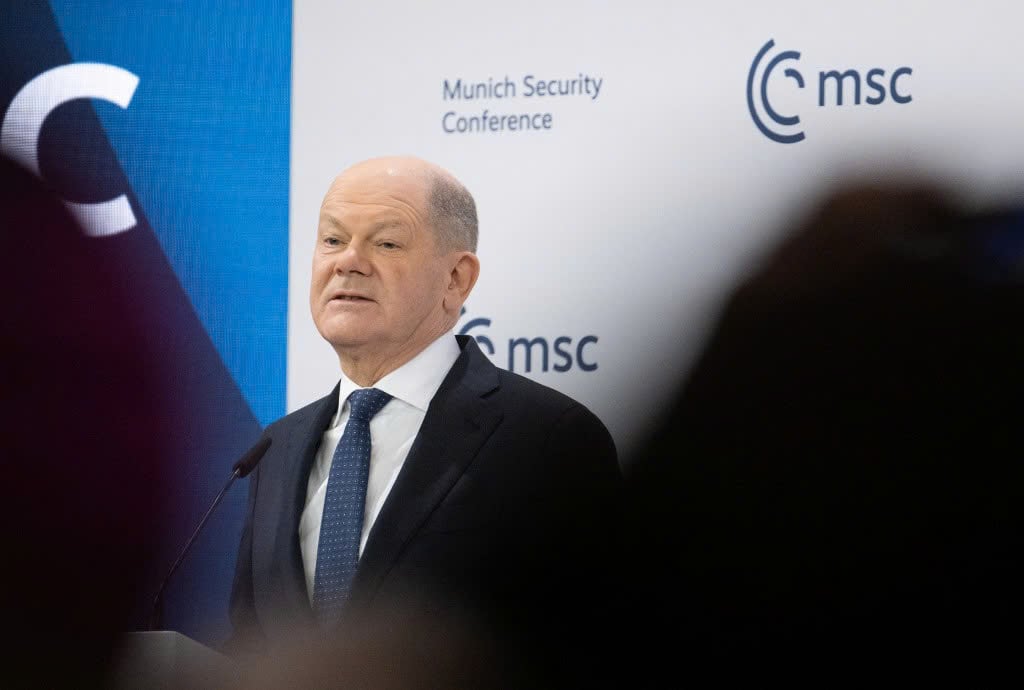Yesterday (February 15), German Chancellor Olaf Scholz delivered a speech at the Munich Security Conference, which is taking place in Munich, Germany, from February 14-16.
Not just with the EU
Chancellor Scholz's speech strongly refuted an earlier statement by US Vice President JD Vance on February 14th, also at the Munich Security Conference. In his speech, Vice President Vance criticized European governments for censoring freedom of speech and political opponents.

German Chancellor Olaf Scholz at the Munich Security Conference
Also on February 14th, US Vice President Vance met with the leader of the far-right AfD party – a German political party with a far-right orientation that is gaining prominence in Europe. Recently, both traditional political circles in European countries and the European Union (EU) have sought to curb the rise of far-right parties.
Speaking at the Munich Security Conference, Vice President Vance remarked that Europe's biggest challenge is not Russia or China, but rather its own internal problems. The US Vice President argued that European countries have gone against democratic values by restricting the activities of far-right political parties and imposing harsh laws, including prohibiting prayer near abortion clinics. Vance asserted that Europe no longer shares the democratic values that were once aligned with those of the United States.
For many years, the US has often used the concept of "shared values" or "similar values" as a key means of connecting and strengthening cooperation with allies and partners. Therefore, Mr. Vance's statement seems to have severed that link between the US and Europe.
Therefore, Vance's statement is seen as a slap in the face to European countries, especially after US President Donald Trump's recent phone call with Russian President Vladimir Putin regarding the Ukraine conflict. The agreement between Washington and Moscow is believed to have bypassed European countries.
Responding to the statement regarding Germany's far-right AfD party, which the US Vice President mentioned, German Chancellor Scholz declared: "That is inappropriate, especially between friends and allies. We firmly reject that." Scholz also affirmed that there are "legitimate reasons" not to work with the AfD.
The US and Europe are finding it difficult to reach a consensus on the Ukraine issue.
Not only is the US experiencing tension with the EU, but it is also showing signs of hostility towards its vital ally, the UK. Specifically, regarding the peace talks for Ukraine, US Defense Secretary Pete Hegseth sent a message stating that Kyiv would not be admitted to NATO. However, in a meeting with Ukrainian President Volodymyr Zelensky, British Prime Minister Keir Starmer affirmed on February 14th that Ukraine's accession to NATO is almost inevitable.
A common army for Europe?
Also speaking at the Munich Security Conference, Ukrainian President Volodymyr Zelensky declared that Kyiv would not accept peace talks without its participation. Zelensky's message was a rebuttal to the terms of the agreement that US President Donald Trump reached with Russian President Vladimir Putin regarding a peaceful solution to the Ukrainian conflict.
"We will never accept agreements without our participation," The Guardian quoted him as saying. At the same time, President Zelensky affirmed that he would not rule out the issue of Ukraine joining NATO during peace negotiations. This is seen as an attempt by Kyiv to strengthen Ukraine's security capabilities after reaching an agreement with Russia.
Furthermore, President Zelensky called on European leaders to act for their own benefit. His proposed solution was to consider establishing a common European army.
In fact, the idea of a common European army originated in the 1950s at the suggestion of France. However, the rise of NATO caused this idea to be buried for decades. Nevertheless, throughout the past half-century, France has sought to reduce American influence in Europe in general, and NATO in particular.
Therefore, with the recent tensions between the US administration under President Trump and Europe, and Washington's tendency to encourage European countries to contribute more to NATO, the idea of a common European army is gaining attention.
Source: https://thanhnien.vn/khau-chien-my-chau-au-185250215220348294.htm



![[Photo] General Secretary To Lam attends the meeting between voters and candidates for the 16th National Assembly.](https://vphoto.vietnam.vn/thumb/1200x675/vietnam/resource/IMAGE/2026/02/26/1772088196117_a1-bnd-7412-5887-jpg.webp)














































































































Comment (0)